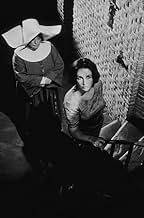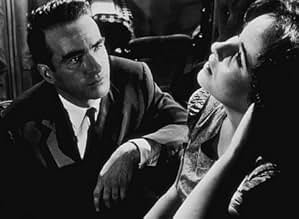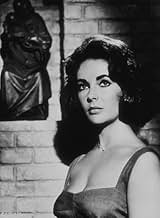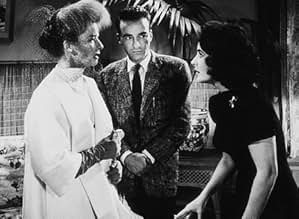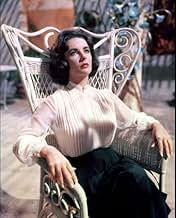Ein Chirurg wird mit dem Fall einer jungen Frau beauftragt, deren Tante möchte, dass sie lobotomiert wird, um ein Familiengeheimnis zu verbergen.Ein Chirurg wird mit dem Fall einer jungen Frau beauftragt, deren Tante möchte, dass sie lobotomiert wird, um ein Familiengeheimnis zu verbergen.Ein Chirurg wird mit dem Fall einer jungen Frau beauftragt, deren Tante möchte, dass sie lobotomiert wird, um ein Familiengeheimnis zu verbergen.
- Für 3 Oscars nominiert
- 4 Gewinne & 7 Nominierungen insgesamt
Sheila Robins
- Dr. Hockstader's Secretary
- (as Sheila Robbins)
Erik Chitty
- Asylum Inmate
- (Nicht genannt)
Grace Denbeigh-Russell
- Asylum patient
- (Nicht genannt)
Brenda Dunrich
- Nurse
- (Nicht genannt)
Eddie Fisher
- Street Urchin
- (Nicht genannt)
Anthony Lang
- Inmate
- (Nicht genannt)
Aileen Lewis
- Nurse
- (Nicht genannt)
Empfohlene Bewertungen
New Orleans, 1937. Doctor Cukrowicz is summoned to the home of Violet Venable, he is encouraged to go by his father who sees a ripe opportunity to get a significant amount of funding directly out of the rich widow. Venable tells Cukrowicz of her niece, Catherine, who has been diagnosed as having a mental disease that causes her to have outbursts etc. She wants Cukrowicz to carry out a lobotomy on Kathryn without question. However Cukrowicz meets with Catherine and finds her trapped behind memories that she won't let herself remember. He tries to draw out whatever her stepmother is so desperate to have cut out.
I watched this with no prior knowledge of what it was about or any of the hidden themes that are brought out after viewing. I suspect I was able to come to it `clean' as a result. The plot starts simply and I wasn't sure where it was going. Then Mrs Venable is introduced and we learn of her desire to have Catherine lobotomised. This is followed by the question what happened to Sebastion (Venable's son) that has sent Catherine mad and sent Mrs Venable to the point where she wants to cut it out of her memory. This question looms large over the film and is very effective in driving the plot forward.
The clues are given all along to what a messed up situation the whole thing is and the final 15 minutes are powerful despite some weaknesses. The plot has talked up the romance part of the film between Catherine and Dr Cukrowicz, I assume to try and cover the unpleasant business and make it easier on a fifties audience, this takes away a little bit but didn't distract me too much from the central tale.
Hepburn is magnificent in her role and her opening scene does much to captivate you for the rest of the movie. Taylor is good but at times feels too polished to be in her character's predicament. Clift was too stale for me and didn't really stand out when placed beside these two actresses going hell for leather for their roles.
Overall I enjoyed this film. The tension of the central questions is built on well with mystery and dark secrets hinted at constantly. The underlying themes add to it but you don't lose anything if you don't see them and the dark secret is powerful and meaningful even if it must do well by the censors of the day. Glad I stumbled onto it.
I watched this with no prior knowledge of what it was about or any of the hidden themes that are brought out after viewing. I suspect I was able to come to it `clean' as a result. The plot starts simply and I wasn't sure where it was going. Then Mrs Venable is introduced and we learn of her desire to have Catherine lobotomised. This is followed by the question what happened to Sebastion (Venable's son) that has sent Catherine mad and sent Mrs Venable to the point where she wants to cut it out of her memory. This question looms large over the film and is very effective in driving the plot forward.
The clues are given all along to what a messed up situation the whole thing is and the final 15 minutes are powerful despite some weaknesses. The plot has talked up the romance part of the film between Catherine and Dr Cukrowicz, I assume to try and cover the unpleasant business and make it easier on a fifties audience, this takes away a little bit but didn't distract me too much from the central tale.
Hepburn is magnificent in her role and her opening scene does much to captivate you for the rest of the movie. Taylor is good but at times feels too polished to be in her character's predicament. Clift was too stale for me and didn't really stand out when placed beside these two actresses going hell for leather for their roles.
Overall I enjoyed this film. The tension of the central questions is built on well with mystery and dark secrets hinted at constantly. The underlying themes add to it but you don't lose anything if you don't see them and the dark secret is powerful and meaningful even if it must do well by the censors of the day. Glad I stumbled onto it.
Katharine Hepburn is a wealthy woman who uses her checkbook in the hopes of having her niece lobotomized in "Suddenly, Last Summer," a 1959 film directed by Joseph Mankiewicz and starring Elizabeth Taylor, Katharine Hepburn, Montgomery Clift, and Mercedes McCambridge.
Hepburn plays Mrs. Venable, whose son, Sebastian, died the previous summer of a heart attack. However, her niece Cathy, who accompanied Sebastian, has had a sort of breakdown and is institutionalized.
Mrs. Venable wants Cathy lobotomized. Before doing so, however, the gifted surgeon (Clift), sent there by his boss as Mrs. Venable dangles money for the hospital in front of him, becomes determined instead to find out what happened and how Sebastian really died.
This is a film that would never be made today - it's character-driven and has too much dialogue. It's a shame because the dialogue is excellent. A previous Mankiewicz film, "All About Eve," is word-rich as well, and there the dialogue sparkles. Here it is more poetic. And, like "Eve," the great roles are the womens.
Though references to homosexuality are only inferred, this film and the much more poorly adapted "Cat on a Hot Tin Roof" hold up very well today. With homosexuality much more discussed, the role this plays in both plots is very obvious, at least to this viewer.
In "Suddenly, Last Summer," Sebastian's proclivities are evident from the beginning as Mrs. Venable describes an almost husband-wife relationship with her son, claiming to the surgeon that Sebastian was "chaste" and that her relationship with him was enough for her son.
One of the comments here mentioned that "Cathy is crazy, like all Williams heroines." But in truth, Cathy like Blanche is disturbed (though Blanche may be a little closer to being nuts) and both are "put away" to shut them up - Blanche for her accusations against Stanley and Cathy because she knows how Sebastian really died.
Katharine Hepburn gives a brilliant performance as Mrs. Venable - charming but made of steel, her anger and jealousy toward her niece just barely beneath the surface.
Elizabeth Taylor gives one of her best performances under the strong direction of Mankiewicz. Taylor was blessed with great beauty but alas, not a great speaking voice. However, she is nevertheless very effective, particularly in her long, harrowing monologue near the end of the film.
Clift's passive portrayal of the surgeon is problematic, and one wonders why he was cast. The opening scene in which he performs an operation had to be redone many times because of his drunkenness and codeine addiction - he was washing down the pills with brandy; his voice quavers, he is unsteady on his feet, and his eyes are glassy.
He comes off a little better in the previous year's "Lonelyhearts," though in that film, he actually winces in pain when he has to sit. While Clift had the support of his fellow actors, he had none from Mankiewicz and producer Sam Spiegel.
Had it not been for Elizabeth Taylor's insistence, he would have been replaced. It seems cruel (as it did to Hepburn at the time) but Mankiewicz was trying to make a movie and Spiegel wanted it to be on budget - Clift's addictions and physical problems weren't helping. He couldn't remember lines; when he finally said them, he was often inaudible; and he was always late arriving on the set.
Fortunately for audiences, this wasn't his last big-budget role. Under the direction of Elia Kazan, he would do the magnificent "Wild River" and seemingly be more in control.
Despite this, "Suddenly, Last Summer" is an excellent, disturbing film, and is highly recommended. It's not Williams' best play, but it is served well in its film adaptation.
Hepburn plays Mrs. Venable, whose son, Sebastian, died the previous summer of a heart attack. However, her niece Cathy, who accompanied Sebastian, has had a sort of breakdown and is institutionalized.
Mrs. Venable wants Cathy lobotomized. Before doing so, however, the gifted surgeon (Clift), sent there by his boss as Mrs. Venable dangles money for the hospital in front of him, becomes determined instead to find out what happened and how Sebastian really died.
This is a film that would never be made today - it's character-driven and has too much dialogue. It's a shame because the dialogue is excellent. A previous Mankiewicz film, "All About Eve," is word-rich as well, and there the dialogue sparkles. Here it is more poetic. And, like "Eve," the great roles are the womens.
Though references to homosexuality are only inferred, this film and the much more poorly adapted "Cat on a Hot Tin Roof" hold up very well today. With homosexuality much more discussed, the role this plays in both plots is very obvious, at least to this viewer.
In "Suddenly, Last Summer," Sebastian's proclivities are evident from the beginning as Mrs. Venable describes an almost husband-wife relationship with her son, claiming to the surgeon that Sebastian was "chaste" and that her relationship with him was enough for her son.
One of the comments here mentioned that "Cathy is crazy, like all Williams heroines." But in truth, Cathy like Blanche is disturbed (though Blanche may be a little closer to being nuts) and both are "put away" to shut them up - Blanche for her accusations against Stanley and Cathy because she knows how Sebastian really died.
Katharine Hepburn gives a brilliant performance as Mrs. Venable - charming but made of steel, her anger and jealousy toward her niece just barely beneath the surface.
Elizabeth Taylor gives one of her best performances under the strong direction of Mankiewicz. Taylor was blessed with great beauty but alas, not a great speaking voice. However, she is nevertheless very effective, particularly in her long, harrowing monologue near the end of the film.
Clift's passive portrayal of the surgeon is problematic, and one wonders why he was cast. The opening scene in which he performs an operation had to be redone many times because of his drunkenness and codeine addiction - he was washing down the pills with brandy; his voice quavers, he is unsteady on his feet, and his eyes are glassy.
He comes off a little better in the previous year's "Lonelyhearts," though in that film, he actually winces in pain when he has to sit. While Clift had the support of his fellow actors, he had none from Mankiewicz and producer Sam Spiegel.
Had it not been for Elizabeth Taylor's insistence, he would have been replaced. It seems cruel (as it did to Hepburn at the time) but Mankiewicz was trying to make a movie and Spiegel wanted it to be on budget - Clift's addictions and physical problems weren't helping. He couldn't remember lines; when he finally said them, he was often inaudible; and he was always late arriving on the set.
Fortunately for audiences, this wasn't his last big-budget role. Under the direction of Elia Kazan, he would do the magnificent "Wild River" and seemingly be more in control.
Despite this, "Suddenly, Last Summer" is an excellent, disturbing film, and is highly recommended. It's not Williams' best play, but it is served well in its film adaptation.
While the symbolism here is about as heavy as a sledgehammer, it's offered in such artfully poetic style that only writers of the caliber of Tennessee Williams and Gore Vidal could give us. What they have done is provide KATHARINE HEPBURN with a role that fits her like a glove and where her mannered acting sits comfortably on a role she was born to play. She is totally mesmerizing as Mrs. Venable, a woman who has lavished all her hopes and dreams on her only son only to have them all swept away on a brutal summer day, "suddenly, last summer", under the hot Mediteranean sun. She gets to spout the most poetic dialog in the film, with ELIZABETH TAYLOR not far behind, especially during their frequent monologues.
This leaves MONTGOMERY CLIFT, as a surgeon who is asked to perform a lobotomy on Miss Taylor, hovering in the background and looking like a frightened sparrow most of the time, although it is he who uncovers the truth about last summer. Mr. Clift must have been at a difficult phase of his own personal life because he performs in a stiff, robot-like manner that makes him seem dubious as a skilled surgeon with steady hands.
All of this is highly melodramatic as only Tennessee Williams can muster, while at the same time affording us the luxury of watching two commanding performances from Hepburn and Taylor that were justifiably nominated for Oscars.
The tale seems burdened by too much heavy-handed poetry but somehow it holds the attention because of the forceful acting by a fine cast. Mercedes McCambridge is a standout as Taylor's mother in the sort of fluttery, birdbrain role one might suspect would be offered to Billie Burke if this had been filmed in the 1940s.
By the end of the film, Miss Hepburn is so far removed from reality that she thinks Dr. Sugar (Montgomery Clift) is her son Sebastian and seems more like a candidate for lobotomy than the plucky Miss Taylor. Taylor never quite has the air of vulnerability that the role demands, but she gives a colorful, if strident, performance as the poor victimized girl who was used as bait by her playboy cousin.
This leaves MONTGOMERY CLIFT, as a surgeon who is asked to perform a lobotomy on Miss Taylor, hovering in the background and looking like a frightened sparrow most of the time, although it is he who uncovers the truth about last summer. Mr. Clift must have been at a difficult phase of his own personal life because he performs in a stiff, robot-like manner that makes him seem dubious as a skilled surgeon with steady hands.
All of this is highly melodramatic as only Tennessee Williams can muster, while at the same time affording us the luxury of watching two commanding performances from Hepburn and Taylor that were justifiably nominated for Oscars.
The tale seems burdened by too much heavy-handed poetry but somehow it holds the attention because of the forceful acting by a fine cast. Mercedes McCambridge is a standout as Taylor's mother in the sort of fluttery, birdbrain role one might suspect would be offered to Billie Burke if this had been filmed in the 1940s.
By the end of the film, Miss Hepburn is so far removed from reality that she thinks Dr. Sugar (Montgomery Clift) is her son Sebastian and seems more like a candidate for lobotomy than the plucky Miss Taylor. Taylor never quite has the air of vulnerability that the role demands, but she gives a colorful, if strident, performance as the poor victimized girl who was used as bait by her playboy cousin.
Film versions of Tennessee Williams great plays can be a little frustrating, especially for those of us lucky enough to have seen a fine production of the play on stage. I saw a fine production of this piece in London in 1999, with Sheila Gish as Mrs Venable, Rachel Weisz as Catherine and Gerard Butler as Doctor Cukrowicz.
But this film version is actually extremely good. The cast more or less speaks for itself. Katherine Hepburn is not quite as repulsive as I imagine Mrs Venable to have become, but this is a movie version after all and somehow Katherine Hepburn seemed to become increasingly ghastly as the movie goes on - strong work on her part and the Director's part I shouldn't wonder. Taylor and Clift are predictably good.
Most Tennessee William's plays had their endings tampered with for Hollywood and this piece is no exception. However, there is only a subtle difference between the ending of the film and the ending of the play, unlike the cringe-inducing changes to some ("Streetcar" and "Cat" being the main offenders).
This is not William's best-known piece, but it is one of my favourites and this film version also slots in right up there with the very, very best.
Well worth seeing, is this.
But this film version is actually extremely good. The cast more or less speaks for itself. Katherine Hepburn is not quite as repulsive as I imagine Mrs Venable to have become, but this is a movie version after all and somehow Katherine Hepburn seemed to become increasingly ghastly as the movie goes on - strong work on her part and the Director's part I shouldn't wonder. Taylor and Clift are predictably good.
Most Tennessee William's plays had their endings tampered with for Hollywood and this piece is no exception. However, there is only a subtle difference between the ending of the film and the ending of the play, unlike the cringe-inducing changes to some ("Streetcar" and "Cat" being the main offenders).
This is not William's best-known piece, but it is one of my favourites and this film version also slots in right up there with the very, very best.
Well worth seeing, is this.
Superb acting by Katharine Hepburn, Elizabeth Taylor, and Montgomery Clift spark this nifty adaptation of Tennessee Williams' play. This Southern Gothic tale is worthy of Flannery O'Connor as it pits innocent Catherine against her aunt Violet as they battle over the memory and reality of Sebastian Venable.
With hints of incest and homosexuality along with family jealousies and squabbling, the women go at each other as they each go after the new doctor from Chicago (Clift). Violet wants the girl committed to an asylum where she will be given a lobotomy. The girl battles back as she recalls the real truth about Sebastian. Her greedy family (Mercedes McCambridge, Gary Raymond) are perfectly willing to sacrifice Catherine for a chunk of money. Everyone is a vulture in this story. The asylum is run by another greedy man (Albert Dekker) who only wants Venable money for a new hospital wing.
After Sebastian casts aside mother (Hepburn) for his summer trip and takes Catherine (Taylor), the older woman starts working to get her revenge. But when Sebastian dies, she goes into mourning as well. Complicated story of innuendo and symbol, one is never quite sure what happens to Sebastian who is symbolically eaten by the boys he has sexually preyed on (heavens to Michael Jackson!). But the sight of his death drives Catherine nuts. The mother of course is in denial of every unsavory trait Sebastian possessed.
Brilliant, florid dialog and two wonderful, long soliloquies by Hepburn and Taylor are highlights. The symbolism is fairly obvious but works well within the context of Southern Gothic. All the supporting cast is fine. Taylor and Hepburn earned best actress Oscar nominations. Gore Vidal, Tennessee Williams, and his partner, Frank Merlo, are in the opening surgery scene. A fascinating story and some great performances.
Special mention must be made of Gore Vidal's brilliant screenplay, expanding the one-act play by Tennessee Williams (who had nothing to do with the screenplay, despite his billing). Vidal perfectly captures the cadence of Williams' speeches and maintains the Gothic mystery Williams was trying for. Vidal lost his chance for an Oscar nomination after the film Catholic Church attacked the film his its implied (gasp!) tale of homosexuality.
With hints of incest and homosexuality along with family jealousies and squabbling, the women go at each other as they each go after the new doctor from Chicago (Clift). Violet wants the girl committed to an asylum where she will be given a lobotomy. The girl battles back as she recalls the real truth about Sebastian. Her greedy family (Mercedes McCambridge, Gary Raymond) are perfectly willing to sacrifice Catherine for a chunk of money. Everyone is a vulture in this story. The asylum is run by another greedy man (Albert Dekker) who only wants Venable money for a new hospital wing.
After Sebastian casts aside mother (Hepburn) for his summer trip and takes Catherine (Taylor), the older woman starts working to get her revenge. But when Sebastian dies, she goes into mourning as well. Complicated story of innuendo and symbol, one is never quite sure what happens to Sebastian who is symbolically eaten by the boys he has sexually preyed on (heavens to Michael Jackson!). But the sight of his death drives Catherine nuts. The mother of course is in denial of every unsavory trait Sebastian possessed.
Brilliant, florid dialog and two wonderful, long soliloquies by Hepburn and Taylor are highlights. The symbolism is fairly obvious but works well within the context of Southern Gothic. All the supporting cast is fine. Taylor and Hepburn earned best actress Oscar nominations. Gore Vidal, Tennessee Williams, and his partner, Frank Merlo, are in the opening surgery scene. A fascinating story and some great performances.
Special mention must be made of Gore Vidal's brilliant screenplay, expanding the one-act play by Tennessee Williams (who had nothing to do with the screenplay, despite his billing). Vidal perfectly captures the cadence of Williams' speeches and maintains the Gothic mystery Williams was trying for. Vidal lost his chance for an Oscar nomination after the film Catholic Church attacked the film his its implied (gasp!) tale of homosexuality.
Wusstest du schon
- WissenswertesAccording to author Garson Kanin in his memoir "Tracy and Hepburn," Katharine Hepburn was reportedly so furious at the way Montgomery Clift was treated by producer Sam Spiegel and director Joseph L. Mankiewicz during filming that, after making sure that she would not be needed for retakes, she told both men off and actually spat at them (although it remains unclear just which one of the two she spat at, or if she spat at both).
- PatzerAlthough set in 1937, costumes, hairstyles and makeup worn by Dame Elizabeth Taylor are all contemporary in 1959.
- Zitate
Catherine Holly: Is that what love is? Using people? And maybe that's what hate is - not being able to use people.
- VerbindungenEdited into Michael Jackson's This Is It (2009)
Top-Auswahl
Melde dich zum Bewerten an und greife auf die Watchlist für personalisierte Empfehlungen zu.
- How long is Suddenly, Last Summer?Powered by Alexa
- What is 'Suddenly, Last Summer' about?
- Is 'Suddenly, Last Summer' based on a book?
- What is a lobotomy?
Details
- Erscheinungsdatum
- Herkunftsländer
- Sprache
- Auch bekannt als
- De repente en el verano
- Drehorte
- Begur, Girona, Catalonia, Spanien(village and old castle scenes)
- Produktionsfirmen
- Weitere beteiligte Unternehmen bei IMDbPro anzeigen
Box Office
- Budget
- 3.000.000 $ (geschätzt)
- Weltweiter Bruttoertrag
- 9.830 $
- Laufzeit1 Stunde 54 Minuten
- Farbe
- Seitenverhältnis
- 1.85 : 1
Zu dieser Seite beitragen
Bearbeitung vorschlagen oder fehlenden Inhalt hinzufügen

Oberste Lücke
By what name was Plötzlich im letzten Sommer (1959) officially released in India in English?
Antwort



